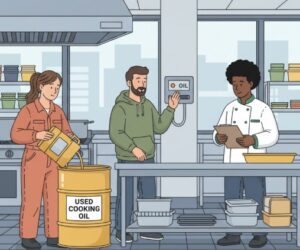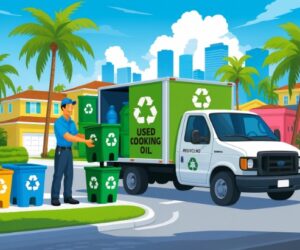
5 Reasons Why Restaurant Grease Recycling Saves You Money and Boosts Sustainability

Restaurants use a lot of cooking oil and grease every day. If you dispose of used grease incorrectly, you’ll incur extra costs, plumbing headaches, and environmental messes.
Recycling grease from restaurants cuts expenses and backs a cleaner, greener future.
More and more businesses are realizing that a few waste management tweaks can help their budgets and the planet.
Understanding Grease Recycling and Its Operational Impact

Recycling grease helps restaurants avoid plumbing issues and use fewer resources. It can also reduce cleaning and repair costs, allowing staff to focus on running the restaurant.
How Grease Recycling Streamlines Restaurant Workflow
Grease recycling services show up and collect used oil right from your kitchen. Staff don’t have to lug heavy containers around or worry about spills.
With regular pickups, storage containers don’t overflow, so kitchen areas stay safer and more organized. This makes it easier for staff to move around during rush hours and reduces stress.
Working with a recycling provider means you get a clear schedule for grease removal—no more guessing or last-minute scrambles. Plenty of businesses are finding that recycling used cooking oil helps reduce overall waste and creates efficiency.
Reducing Maintenance and Cleaning Costs Through Recycling
When you recycle grease correctly, oil and fat don’t end up in sinks and drains. That means fewer clogs—those annoying blockages that always seem to show up at the worst possible time.
Fewer clogs mean you’ll spend less on plumbing repairs. Plus, your sinks and drains work better, which is a relief.
Regular grease pickup keeps storage areas much cleaner and helps reduce nasty odors that tend to linger.
Letting professionals handle grease containers lowers contamination risks. The restaurant stays healthier, and walking into a place that doesn’t reek of old oil feels better.
Restaurants that recycle grease usually deal with fewer emergency cleanups. Spills and leaks don’t happen as often, which is a win for everyone.
This also helps avoid health code violations and saves money on cleaning supplies and labor.
Get ahead of FOG violations with Grease Pros Recycling. Our used cooking oil pickup service includes free containers and full compliance support. Schedule a pickup now.
If you’re ready to get started, call us now!
1) Prevents costly plumbing blockages and sewer line damage.

Kitchen work creates a lot of grease, especially during busy hours. If you pour that stuff down the drain or toss it out wrong, it starts sticking inside your pipes.
Grease buildup blocks plumbing, slows drainage, and causes nasty backups. Fixing pipe clogs isn’t just annoying—it’s expensive and can disrupt service.
Grease that sneaks into the sewer system can damage more than just your restaurant. Clogged city sewer lines cause overflows, leading to fines from local officials.
When you recycle grease, you dodge those risks. By recycling used cooking oil, restaurants keep their pipes—and the city’s—working better.
Industry reports back this up: recycling used cooking oil protects your plumbing and the city’s. Grease management also keeps you on the right side of local rules and helps you avoid unwanted disruptions.
Regular recycling means fewer emergencies and lower repair bills. Staff can focus on serving customers instead of calling plumbers.
2) Reduces waste disposal fees by diverting used oil.
Restaurants produce a lot of used cooking oil every day. If you just toss it, it either ends up in a landfill or you pay for it to be hauled away as waste.
Recycling used oil can help you avoid many disposal fees. Getting rid of liquid waste isn’t cheap, and special handling can add up fast.
Recycling programs pick up the oil for you, so you don’t have to pay for regular removal or landfill costs. That’s less oil down the drain, fewer garbage bin messes, and less risk of clogged pipes.
Some recycling companies even pay you or pick up your oil for free. Suddenly, what used to be a headache becomes a source of revenue instead of a bill.
Diverting oil from the trash helps restaurants run more efficiently and spend less on waste. It’s a small change with a real payoff, especially if you use a lot of oil.
3) Supports biodiesel production, promoting sustainable fuel use.
Recycling restaurant grease helps make biodiesel, a renewable fuel. Used cooking oil is collected, cleaned, and turned into biodiesel at special facilities.
Biodiesel burns cleaner than regular diesel and puts out fewer harmful emissions. It’s just better for the environment than burning fossil fuels.
Using biodiesel also means we use less petroleum. That’s good for energy security and cuts down dependence on foreign oil. Plenty of businesses and city fleets already use biodiesel in their vehicles.
Restaurants that recycle grease join a bigger push for renewable energy. The demand for biodiesel is raising the value of used cooking oil, so it’s not just waste anymore.
Instead of tossing out grease, restaurants can have it picked up and put to good use. Some programs even pay or offer discounts for your used oil. As biodiesel gets more popular, the benefits for restaurants just keep growing.
Keep your commercial kitchen safe and compliant. Grease Pros Recycling provides fast emergency oil retrieval services throughout Florida. Request emergency service today.
If you’re ready to get started, call us now!
4) Streamlines kitchen grease management, improving efficiency.
Having a proper grease recycling system just makes life easier for restaurant staff. Clear steps and reliable storage mean less time worrying about where to dump waste.
Modern tech has changed how kitchens deal with grease. Automated disposal systems speed things up and reduce messy manual handling, making the kitchen safer.
When grease is managed well, things just flow better. Fewer sink blockages mean less downtime and fewer surprise repair bills. Efficient grease management also helps keep workspaces cleaner and less cluttered.
Professional grease recycling services can handle everything from pickup to disposal. That’s less hassle for your team and more time for actual kitchen work. Experts say comprehensive grease management can boost a restaurant’s efficiency.
Simplifying these tasks means fewer interruptions. When staff know exactly what to do with grease and oil, the kitchen runs better, and everyone is less stressed.
5) Lowers the risk of fines related to improper oil disposal.
Restaurants must follow strict rules for disposing of used oil. Tossing it down the drain or in the trash can quickly land you in legal trouble.
Local and state governments fine people who don’t handle grease and oil properly. Improper oil disposal can block pipes and pollute waterways, which cities take seriously.
Oil in the sewer system can cause expensive damage, and restaurants might be stuck with cleanup bills. Recycling used cooking oil helps you follow the rules and avoid fines.
Recycling companies pick up the oil and handle it safely. This shows your restaurant cares about the law and the environment, which is never a bad look.
Legal compliance means fewer surprise costs. Fines aren’t always small—they add up. Grease recycling is an easy way to protect your business from these headaches.
Having a recycling plan also makes health inspections smoother. Inspectors check how you store and remove oil, so safe recycling practices help you pass without issues.
Ready to build a safer, greener kitchen? Contact Grease Pros Recycling for a complete grease management solution, from containers to hood cleaning. Get started here.
Contact Us Today For An Appointment
Frequently Asked Questions
What is grease recycling, and why is it important in Florida?
Grease recycling involves collecting and converting used cooking oil into products like biodiesel. It prevents sewer backups, supports sustainability, and helps Florida kitchens stay compliant.
Does the law require grease recycling in Florida?
Yes. Florida municipalities enforce FOG ordinances requiring food service businesses to recycle used oil through licensed haulers. Non-compliance can lead to fines or health code violations.
How do I start a grease recycling program in my Florida kitchen?
Start by partnering with a licensed hauler like Grease Pros Recycling. They offer free containers, pickup schedules, and compliance support tailored to your kitchen’s size and output.
What equipment do I need for proper grease recycling?
You’ll need sealed storage containers such as 55-gallon drums or under-counter tanks. Grease Pros Recycling provides these at no cost with their service agreement.
How often should grease pickups be scheduled in Florida?
Weekly or bi-weekly pickups are standard, depending on kitchen volume. Routine pickups prevent overflow, bad odors, and fines from inspectors.
Can I pour used cooking oil down the drain if it’s filtered?
No. Even filtered oil can solidify and clog pipes. It’s illegal and environmentally damaging. Always store oil in designated containers for recycling.
What happens to the recycled grease collected by haulers?
Recycled grease is refined into biodiesel or reused in industrial processes, reducing landfill waste and supporting Florida’s renewable energy goals.





